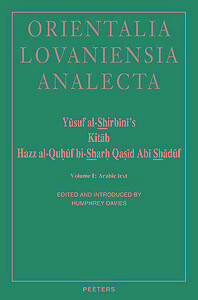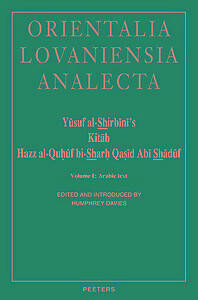
- Afhalen na 1 uur in een winkel met voorraad
- Gratis thuislevering in België vanaf € 30
- Ruim aanbod met 7 miljoen producten
- Afhalen na 1 uur in een winkel met voorraad
- Gratis thuislevering in België vanaf € 30
- Ruim aanbod met 7 miljoen producten
Zoeken
Yusuf Al-Shirbini's Kitab Hazz Al-Quhuf Bi-Sharh Qasid ABI Shaduf ('Brains Confounded by the Ode of Abu Shaduf Expounded')
Volume I: Arabic Text
Davies H.T.
€ 222,45
+ 444 punten
Omschrijving
The work, written in 1686 or soon after, takes the form of a lengthy introduction to and commentary on a poem supposedly composed by an Egyptian peasant in which the latter describes the ill times on which he has fallen and lists the dishes he dreams of eating. This format allows the author both to attack rural society (which he divides into peasants, jurisprudents (fuqaha'), and Sufis (fuqara')) and to play for comic effect with the conventions of the then central text-and-commentary genre. In so doing, he not only provides important information on rural Lower Egypt during an understudied period but reveals many of the concerns of the educated vis-a-vis the masses, whether rural or urban. The work also contains the longest passages of colloquial Egyptian known from before the nineteenth century. It will interest students of Arabic literature, Ottoman Egyptian culture, the socio-economic and intellectual history of Egypt, rural-urban relations in Egypt, and Arabic linguistics.
Specificaties
Betrokkenen
- Auteur(s):
- Uitgeverij:
Inhoud
- Aantal bladzijden:
- 517
- Taal:
- Engels
- Reeks:
Eigenschappen
- Productcode (EAN):
- 9789042915275
- Verschijningsdatum:
- 1/12/2005
- Uitvoering:
- Hardcover
- Formaat:
- Genaaid
- Afmetingen:
- 168 mm x 247 mm
- Gewicht:
- 1437 g

Alleen bij Standaard Boekhandel
+ 444 punten op je klantenkaart van Standaard Boekhandel
Beoordelingen
We publiceren alleen reviews die voldoen aan de voorwaarden voor reviews. Bekijk onze voorwaarden voor reviews.







